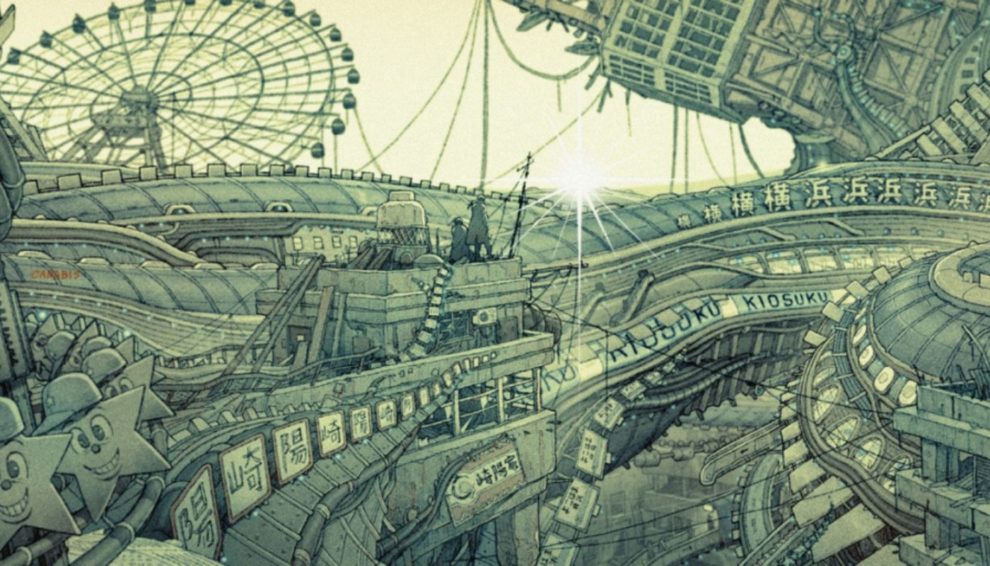“All Hiroto has ever known is a life on a tiny coastal speck of Japan. Much of the country has been swallowed by Yokohama Station, a mysterious, ever-growing series of buildings that's been around for as long as anyone can remember. The few who live outside its many entrances have never seen Inside and know only rumors and legends of the station's interior. That all changes when Hiroto is given an 18 Ticket, a mysterious item that lets him enter the massive complex for five days. The young man has always sought a purpose, but the one he finds may not be the sort he'd hoped for…” (Yen Press)
Buy This Title
Exploring a landscape of never ending artificially produced tunnels, “Yokahama Station SF” uses intersecting tales of life on the inside to explore the complexity of a dystopian Japan. Marking a departure from content focused on manga or light novels, Yen Press presents a truly unique experience for their fans. An experience aimed at both sci-fi fanatics and the Japanophiles' that is perfectly crafted to bridge the gap between the two.
The prose of Yuba Isukari balances lofty concepts by utilizing an outsider as a protagonist. Hiroto, who has spent his life on the outskirts of Yokohama station living off scraps, works as an ideal guide for exploring the complex inner working of the station. As a result, his own inquisitive nature to better comprehend the massive structure that has loomed over his village since he was a child, also acts to inform the reader as Hiroto interacts and talks to the denizens within the station. The secondary plot offers a new protagonist who has spent his life around conflict around the growth of the station, giving a different perspective from Hiroto. Ultimately, these intertwining narratives make the expansive universe comprehensible, informative while engaging.

Further creating a sense of accessibility, the novel combines new and ancient tech that feels familiar to a steampunk aesthetic, a genre which has become a big part of modern pop-culture in the West. At the same time, the work is undeniably born out of Isukari's own reflection on Japanese society and obsession with technology that the works still feels like a unique product from Western sentiments towards steampunk genre. Overall, “Yokahama Station SF” is a wonderful amalgamation of influences that holds universal appeal.
“Yokahama Station SF” is a welcome change-up for a publisher like Yen Press that is focused on manga and light novels. Not tied to an anime or manga, the book offers a stand alone sci-fi experience which compliments their catalogue. For fans, titles like this mark potential for other fascinating works to make their way West and should be celebrated as such. In addition, the work is presented in hardcover with a dust jacket and great interior artwork from renowned sci-fi artist Tatsuyuki Tanaka (including a fold out that can act as a mini -poster). On quality alone, the release is an idyllic addition to any otaku or sci-fi aficionados collection.
Working within some abstract concepts in a dystopian landscape, the translation work from Stephen Paul feels deserved of praise. Taking on such work seems like an arduous task, one which can lose a certain flow or become nonsensical within trying to explain the dystopian landscape of Yokahama Station. Thankfully, the narrative is easy to follow and never feels convoluted or muddled in translating the, admittedly, particular genre.
Ultimately, enjoying “Yokahama Station SF” will rest largely with fans of science fiction, but the appeal will not be exclusive to that audience. Myself being a casual fan of the genre, I found Yuba Isakara's approach to land that perfect balance of inclusiveness and nerdy indulgence to ensure the work stays accessible. For fans who are on the fence about whether to try this unique entry in the Yen Press catalogue I would say it is a chance worth taking. Even if the work does not resonate support towards such titles, certainly pushes towards more unique content from the East getting deserved translations.













